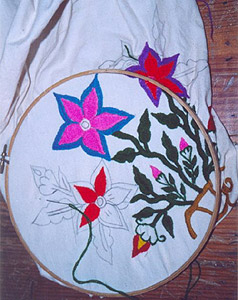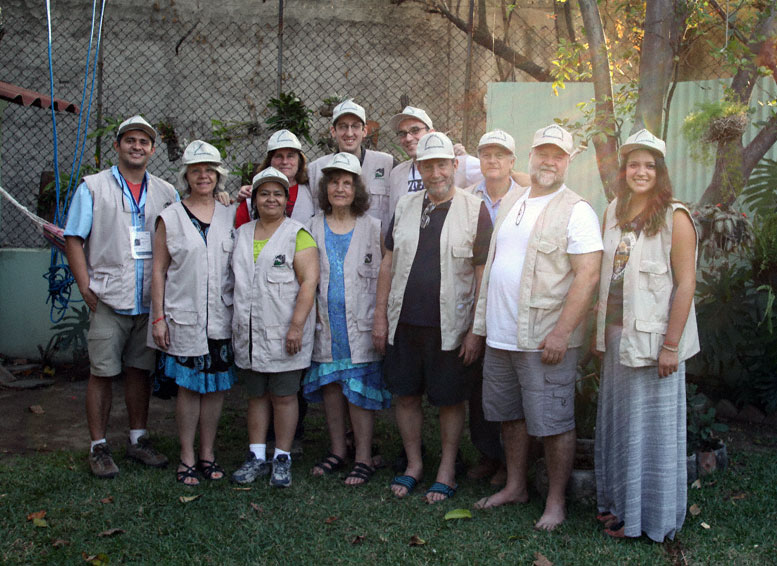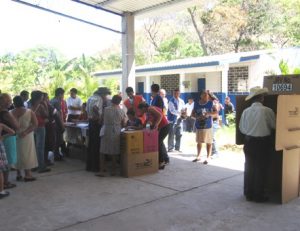Community Development Projects, Delegations
Report of Fair Trade Delegation to El Salvador, March 2008
From the Fair Trade Delegation, March 2008:
Woven into many of USESSC’s sistering relationships are ‘sisters’ working in the North to promote the goods created by co-operatives in our sistered communities in El Salvador. Such co-operatives are a natural part of daily life in the organized communities of CRIPDES, part of an economic model that strengthens community life and sufficiency. Four women, representing four Sister City projects in the US, just returned from a two-week Fair Trade Delegation to El Salvador. Our goals were to strengthen and build our sistering relationships, and to share experiences and strategies about the fair trade work we do or hope to do. We visited our respective sistered communities, plus several others with active cooperatives. During the meetings, we learned about the development of the cooperatives, the new savings and loan women’s groups some communities are forming, their hopes and their dreams. We placed orders, discussed ideas for new products, and saw the great potential of ordering from one another here in the states.
Looking ahead, we plan to have a session on fair trade work at the 2008 Sister Cities National Gathering in Bangor, Maine this coming October; we also will have a marketplace for goods produced by our sisters. A second fair trade delegation is in the works for 2009. We invite you to talk to us, order goods for events, and learn more about the fair trade work group: sistercities@gmail.com. Read on for some of the highlights and our full delegation report.
Carasque
Bangor has had a long relationship with the crochet and sewing cooperatives through the Bangor-Carasque Sister City Project and has been marketing their goods in Maine for over 10 years. The Maine Organic Farmers and Gardeners Association (MOFGA, part of the MOFGA-CCR Sister relationship) and the Carasque crochet coop have worked together to develop a string shopping bag, also sold in Maine. We met with the 25 members of the co-ops in their lovely, new building. In addition to orders from Bangor and MOFGA, these co-ops make uniforms for their own and surrounding communities and sell goods to visiting delegations. The community is currently building a store where they can sell their co-op and agricultural goods.
Products produced: by the Crochet Co-op: purses, hats, baby clothes, hammocks, water bottle carriers, head bands, string shopping bags; by the Sewing/Embroidery Co-op: embroidered totes, aprons, bread cloths, runners, tablecloths, baby clothes
Arcatao
The Madison-Arcatao Sister City relationship is one of the oldest in our network. They have worked with the cooperatives at different levels over the years; currently, Madison has a plan to increase this part of their work. We visited both youth projects and the embroidery co-ops to see their beautiful products. The embroidery group has been at it for 19 years and some of their pieces are of museum quality! A lot of enthusiasm and ideas were shared.
Products produced: by the Embroidery co-op: aprons, runners, tablecloths, t-shirts; by the Youth group: jewelry, note cards, straw bags, wood products
Juan Chacón Coffee
We met with Ernesto Morales, head of CORDES in Chalatenango, at the coffee processing plant in Amayo to discuss the exportation of coffee to the US. The ultimately successful coffee importation project of 2006/07 was extremely challenging, with steep learning curves on both sides. Unfortunately, exporting of coffee will not happen this year, with money being the greatest obstacle. Both CORDES and Just Coffee (the co-operative roaster in Madison, Wis.) are looking for alternatives for financing. There is firm commitment on both sides to try again next year.
Products produced by Chalate farmers: coffee, indigo
Chilama
This spirited community welcomed us with open arms. The Crystal Lake-Chilama relationship is USESSC’s newest sister city project, and Chilama has fewer material resources than the other communities we visited. There are currently no cooperatives producing goods; lack of daycare for the children and lack of training for the women are contributing factors. Some interest was sparked when we talked about what other communities are doing, and through the regional organization of CRIPDES-Sur and the Crystal Lake sistering relationship, we will be in close contact, ready to go forward with initiatives the women develop.
To purchase goods and learn more about Sister Cities’ fair trade work, contact sistercities@gmail.com.



